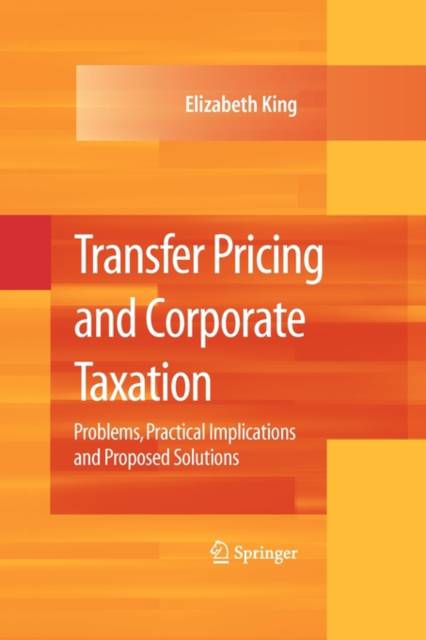
Je cadeautjes zeker op tijd in huis hebben voor de feestdagen? Kom langs in onze winkels en vind het perfecte geschenk!
- Afhalen na 1 uur in een winkel met voorraad
- Gratis thuislevering in België vanaf € 30
- Ruim aanbod met 7 miljoen producten
Je cadeautjes zeker op tijd in huis hebben voor de feestdagen? Kom langs in onze winkels en vind het perfecte geschenk!
- Afhalen na 1 uur in een winkel met voorraad
- Gratis thuislevering in België vanaf € 30
- Ruim aanbod met 7 miljoen producten
Zoeken
Transfer Pricing and Corporate Taxation
Problems, Practical Implications and Proposed Solutions
Elizabeth King
Paperback | Engels
€ 167,95
+ 335 punten
Uitvoering
Omschrijving
National tax authorities individually determine multinational ?rms' country-speci?c tax liabilities by applying one or more sanctioned transfer pricing methodologies. These methodologies are founded on basic assumptions about market structure and ?rm behavior that are rarely empirically valid. Moreover, for the most part, the transfer pricing methodologies now in vogue were developed before the Internet became a dominant factor in the world economy, and hedge and private equity funds transformed ?nancial and commodities markets. For these reasons, multinational ?rms are unable to accurately anticipate their tax liabilities in individual countries, and remain at risk of double taxation. Uncertainties in corporate tax liability are extremely costly, both for individual corporations and from an economy-wide perspective. Firms pay exorbitant fees to have tax attorneys, accountants and economists prepare the documentation required by tax authorities to substantiate their intercompany pricing practices and defend their tax positions on audit. Corporate tax liabilities are also potentially much higher than they would be under a more transparent and predictable transfer pricing regime (due to the potential for double taxation and penalties), and investors' returns are reduced accordingly. The FASB's Interpretation No. 48, Accounting for Uncertainty in Income Taxes (released on July 13, 2006), has motivated multinational ?rms to increase their reserves substantially (in many cases at the insistence of their au- tors), reducing the total funds available for productive investment. 1 The current transfer pricing regimes are embodied in the OECD Guidelines, individual OECD member countries' interpretations thereof, the U. S.
Specificaties
Betrokkenen
- Auteur(s):
- Uitgeverij:
Inhoud
- Aantal bladzijden:
- 194
- Taal:
- Engels
Eigenschappen
- Productcode (EAN):
- 9781441926784
- Verschijningsdatum:
- 29/10/2010
- Uitvoering:
- Paperback
- Formaat:
- Trade paperback (VS)
- Afmetingen:
- 155 mm x 229 mm
- Gewicht:
- 299 g

Alleen bij Standaard Boekhandel
+ 335 punten op je klantenkaart van Standaard Boekhandel
Beoordelingen
We publiceren alleen reviews die voldoen aan de voorwaarden voor reviews. Bekijk onze voorwaarden voor reviews.









